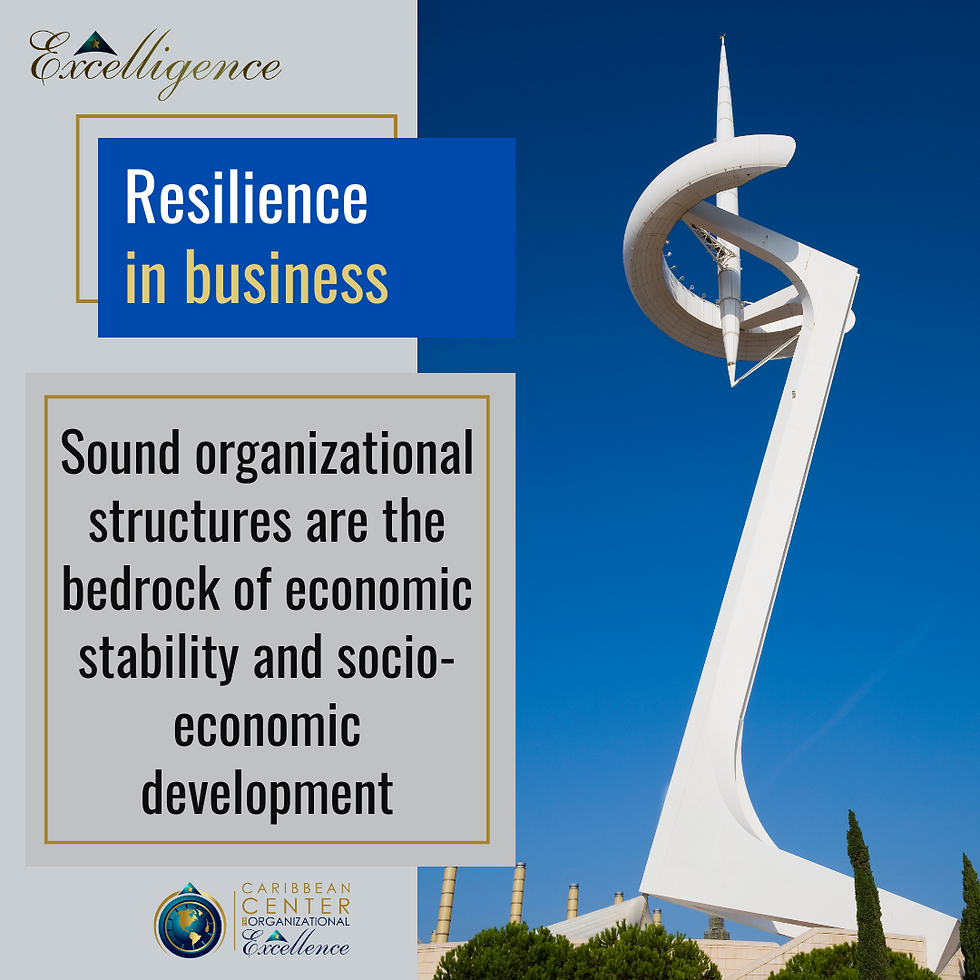
In my book Beyond the Minimum: Principles for Optimizing Organizational Excellence and Achieving High Performance, principle 1-01 states “Sound organizational structures are the bedrock of economic stability and socio-economic development. When the structural integrity of an organization is sound, levels of reliability and the capability to retain existence and dignity in the long term is high.”
The importance of sound organizational structures cannot be overstated. In many ways, they serve as the bedrock of economic stability and socio-economic development. Without a solid foundation, even the most promising enterprises can falter, leading to instability that has the capacity to reverberate far beyond the organization itself.
Sound Structures: The Pillars of Reliability
An organization’s structure is akin to a building's framework. Just as a building requires strong pillars to stand firm against the elements, an organization needs a robust structure to support its operations and growth. When an organization's structural integrity is sound, it ensures that the entity can operate reliably, even in the face of external pressures or internal challenges. This reliability is crucial not only for the organization's day-to-day functioning but also for its long-term viability.
Of equal importance, poorly structured organizations are more expensive to maintain. They consume resources, including time and money, at a faster and sometimes unnecessary rate. They also create uncertainty in the minds of employees regarding the level of reliance they can place on them to secure a meaningful future.
In effect, a well-designed organizational structure delineates clear lines of authority, facilitates effective communication, and promotes efficiency. These elements work together to create an environment where all organization members understand their roles and responsibilities. This is vital for high levels of cohesive and harmonized efforts toward common goals. It is in such environments that both people and the organization thrive and build the capacity to adapt and respond to changes more quickly than their competitors.
Just as a building requires strong pillars to stand firm against the elements, an organization needs a robust structure to support its operations and growth
Long-Term Existence and Dignity
Beyond reliability, a sound organizational structure is essential for ensuring the long-term existence and dignity of the organization. In business, the concept of dignity is often overlooked, yet it is crucial. Dignity as envisaged in Principle 1-01 in the book refers to the organization’s ability to maintain its values, principles, and reputation over time. An organization that operates with dignity is one that can retain the trust of its stakeholders, whether they are customers, employees, or the wider community.
Maintaining dignity is not merely about avoiding scandal or staying out of the headlines; it’s about consistently upholding the organization’s mission and values in every aspect of its operations. This becomes increasingly important as organizations scale and face more complex challenges. A sound structure provides the necessary support to navigate these challenges and hostile winds of change without compromising the core principles that define the organization.
a sound organizational structure is essential for ensuring the long-term existence and dignity of the organization.
The Socio-Economic Impact
Following on from the above, it is vital to note that the stability provided by sound organizational structures extends beyond the organization itself and impacts the broader socio-economic environment. In fact, economies typically thrive when businesses are stable and reliable. When organizations are structured to operate with integrity and dignity, they contribute to a stable economic environment that fosters socio-economic growth and development. Conversely, organizations lacking structural integrity risk contributing to economic instability, which can have far-reaching financial consequences.
Of note, socio-economic development is, in many ways, a byproduct of organizational success. Businesses create jobs, contribute to the tax base, and drive innovation. However, these contributions are only sustainable when organizations are built on a foundation of sound structures. Without this foundation, the potential for positive impact diminishes, and the risks of failure increase. What I am simply saying here is that an organization's structural integrity has the capacity to circle back to and impact the organization.
When organizations are structured to operate with integrity and dignity, they contribute to a stable economic environment that fosters socio-economic growth and development.
Conclusion
Sound organizational structures are indispensable for economic stability and socio-economic development. They provide the framework that allows organizations to operate reliably, maintain their dignity, and contribute positively to the broader economy. As such, investing in and maintaining strong organizational structures should be a priority for any organization that aims to achieve long-term success and make a meaningful impact.

Comments